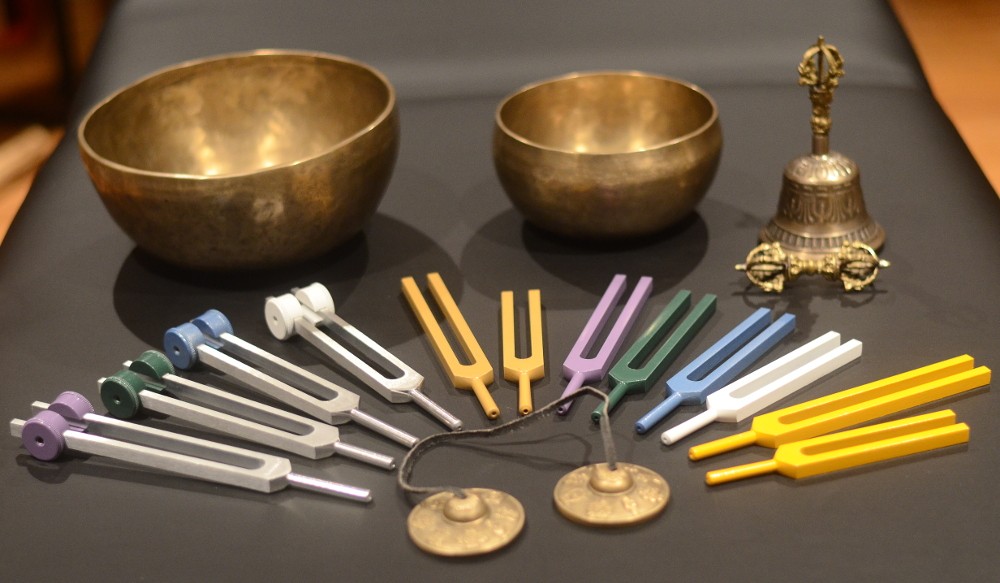Have you ever tried manifesting through sound? 🔉
Sound healing has been used for many centuries as therapy. It dates back to ancient Greece.
Sound healing from the Greek “Art of the Muses.” They are the goddesses who inspired literature, art, and the knowledge of mankind.
Music 🎵 is part of us — it was never discovered. It’s innate.
We use it to express, to celebrate 🥳, to entertain, etc.
And we use it to manifest. But before we discuss that, let’s talk about sound healing first.


1. What is Sound Healing?


1.1 Sound Healing
As mentioned, the use of sound to heal dates back to ancient Greece. Since then, many philosophers such as Plato used it as it affects their emotions and souls.
Today, we use sounds in spiritual growth and medicine. Sound healing is considered as a modern medicine alternative 💊 and certain pieces of evidence suggest that using sound to heal is necessary and effective to one’s emotional and mental health. 🧘🏻♂️
Sound healing is a process wherein music is used to improve the health of an individual. It helps improve various aspects of life such as mental, social, emotional, and cognitive developments.
The process is very versatile — individuals who use sound healing can either simply listen or sing along. They can even play musical instruments 🎻 while doing so.
1.2 How Sound Heals
Sounds create waves in the physical realm. When the waves reach our ears 👂🏻, they are converted into energy that reaches our brains thus triggering a response within us.
As the waves travel through our bodies, it triggers the release of hormones and alters the emotions.
Simply listening to music boosts dopamine in our brains. Dopamine brings in feelings of satisfaction and pleasure. The sound waves also release oxytocin, which is a natural painkiller.
1.3 Tools In Sound Healing


There are various sound tools and instruments that are used in sound healing. These tools create vibrations at different frequencies and they interact differently with our energy field. Some tools can resonate through our chakras while others can influence our aura.
1.4 Here Are Some Of The Tools For Sound Healing:
- Singing bowls – it is often used by striking a mallet or running the mallet around the rim of the bowl to create vibrations.
- Ghanta and Dorje – it is used by striking, clacking, or running the mallet around the rim of the bell.
- Crystal singing bowls – this is made from a quartz crystal that produces vibrations that help align individuals with a single chakra for the balance ⚖️ of specific energy. It is used through striking or singing.
- Gongs – a popular sound healing instrument, the vibration that it creates helps break up stuck energy for better flow. These are just some of the most common tools used in sound healing. Now, let’s move on to how you can use sounds and their tools to help with your manifestation process.
1.5 Sound & Manifestation
Imagine this, every frequency affects your body:
- 396 HZ – this frequency is used if you want to manifest an end of pain in your life. Or if you simply want to be happy!
- 417 HZ – if you want to manifest changes in your life, this frequency helps rid of traumatic experiences and induce change.
- 528 HZ – this is the natural earth frequency in which nature vibrates to repair DNA. 🌍
- 638 HZ – this is used if you want to manifest a better version of yourself towards a person. It also helps promote empathy and release anger. 👫
- 741 HZ – if you want to manifest creativity in your life, this is the right frequency for you. It will help develop your power of self-expression and creativity. 🎨
- 852 HZ – this is for people who wish to manifest a stronger spiritual state.
- 963 HZ – this is known to be the frequency of God. It will empower your inner child that will bring hope and laughter in your life.
Manifesting with sounds is simply like going into a meditation state. The difference here is, you’ll amplify your intentions with the use of sound healing tools.
1.6 Here’s A Step-By-Step Guide To Manifest Using Sounds
- Prepare your sound healing tools.
- Find a quiet place. Sit, be still, and align yourself. 🧘🏼♀️
- Hold your intentions while playing your sound healing tool.
- When you reach that relaxed state, let your heart expand, and slowly envision what you want to come into your life. 💖
- Feel the qualities that resonate with your desires. Let yourself build the emotions and qualities of your heart.
- Be in a state of gratitude. You can play or sing in gratitude to boost your gratefulness of receiving what you want.
I strongly suggest that you make this a habit. You can perform this manifestation process every morning or before bed — whichever is convenient for you.
Making this as part of your daily life will bring you closer to your desires. At the same time, it also relaxes you every single day.
When sound is used properly, you can change your life and change the frequencies on which you operate.
This creates a better life for you and it turns you into a better person.
May everything you want in life come to you! 💫
2. How Sound Influences The Brain


We all know how powerful sound is.
The question is, why?
It’s all about how it affects the brain and triggers our emotions.
2.1 How Sound Is Perceived By The Brain
The brain processes what we hear in waves. It translates impulses from the ear into sounds that we know and understand. When we hear, sound waves travel from the outer ear and then through the middle ear, where the sound vibration stimulates tiny hair cells.
The tiny hair cells in the inner ear send electrical signals to the auditory nerve that is connected to the auditory center of the brain where electrical impulses are perceived by the brain as sound.
A previous study also showed that our hearing works the way our vision works, which has a strobe-like effect in the mind. It helps us focus on the most important sounds in the environment and at the same time, it can help us place sounds in the three-dimensional space.
Sound has a huge impact on us, humans. According to Margareta Andersson, Sound Architect at Lexter Sound Design in Stockholm, “When we lived outdoors, with the forest as our walls and the sky as our roof, we had to trust our senses to survive. Our eyes, taste buds, and ears told us what was safe or not—these so-called genetic memories still linger in our human DNA.”
Scientists also discovered that the brain does not have one special area to analyze music. Instead, different areas of the brain handle various aspects of a song, like a rhythm and tone. It is also noted that that sound or music is wired directly into how we feel.
2.2 Sound And Feelings
Sound can trigger emotions in listeners. The three main areas of the brain that are responsible for these are the nucleus accumbens, amygdala, and the cerebellum. Here are the ways the brain triggers emotions when we hear sound:
- Brain-Stem Reflex: This is a reaction in the subconscious that is hard-wired to the brain that warns you of significant or detrimental sounds.
- Evaluate Conditioning: A lot of us associate sounds with certain emotions based on the context of the sound that we hear.
- Emotional Contagion: Research in the 1990s showed that the brain may have mirror neurons that are active when you’re doing a task and when you’re watching someone else do a certain task.
- Visual Imagery: If you like the sound of the waves crashing, it is likely that the sound creates powerful visual images of it in your brain.
- Episodic Memory: Sounds can activate positive and negative memories. When we experience certain sounds, the brain stores this information for later use. Sensory information, which is a particular sound, is associated with emotional information and stored in the auditory cortex, therefore, it allows the sound to have an emotional meaning.
3. The Healing Sounds Of Animals


The chirping of the birds, the sound of the whale, and even the cat’s purr carry sound healing effects to humans.
The sound that birds make can help bring mental clarity, while the sound of water can entrain the brain to a state of calmness.
We all know that animals use sounds to communicate with each other. Most of the sounds they make are to either defend their territory or to attract females so they can breed.
The sounds of the bird were distinguished to be calls of distress, pleasure, alarm, nesting, and feeding. On the other hand, the sounds that insects are produced by a tapping sound, while certain insects, such as ants and beetles produce a shrill sound by rubbing their legs, wings, and other parts of their body.
Whales, elephants, giraffes, to name a few, use infrasound—a low-frequency sound that is below the range of human ears.
Another sound that is popular for humans is the sound of a cat’s purr.
We are all part of nature, and it provides us with cues to boost our consciousness. The sounds in nature, specifically the ones produced by animals have a higher frequency that charges the cerebral cortex, a part of the auditory system.
Try being in a state of a heightened listening awareness and just listen to the sounds around you. Do this while you’re in nature. Perhaps, you can hear the song of a bird. When you focus on it, you will feel the bird’s song ripple through the body as it subtly alters your awareness.
When we become open to a higher state of consciousness, we begin the inner healing.
There have been pieces of evidence that suggest humans react positively to birdsongs because they’re made up of random sounds. A birdsong doesn’t have a repeating pattern and due to this, it resets our ears that let us hear properly.
Another example is the whale sounds. Whales use sound to communicate and they produce one of the lowest frequencies of all living creatures. When humans listen to a whale song, the brain rhythm slows down to match these low frequencies, which then helps reach the deepest, most restorative stages of sleep.
Humans also have found that a cat’s purr to be healing and comforting. Moreover, cats have the tendency to lie on a party of your body that is ill or aching and purr.
Being one in nature and just by listening can have healing effects on your overall being.
4. Can Sound Healing Help With Depression?


Sound healing has become a buzzword as more and more people are trying it out and experiencing its benefits. Not to mention, the number of celebrities who swore by the wonderful effects of sound healing.
Sound is believed to help with physical, emotion, and mental states. One of the most talked- about mental issues today is depression.
Can sound healing really help with depression?
4.1 Depression
Depression is a feeling of hopelessness and sadness for a long period. Individuals who have depression experience it in weeks, months, or even years. Depression may occur for no reason at all, which makes it difficult to address.
Considered a serious condition, depression can affect physical and mental health. For one, when you are depressed, it can affect how you feel about yourself.
It is known that depression is a result of a chemical imbalance in the brain. However, the exact interactions of brain chemistry is complex and is still not well understood.
Neurochemicals, such as dopamine and serotonin are produced and used in the brain and they are associated with happiness. Therefore, there are medicines that alter these chemicals that are proven to be effective but have difficult side effects.
Luckily, there are alternative treatments available to address depression. One can go to regular therapy sessions and other holistic approaches that can ease the symptoms of depression. Gaining popularity these days is the benefit of sound healing.
4.2 Sound Healing For Depression
We emit energy and frequencies, and the universe as well. Everything on this planet has energies. Sound has been used as a form of spiritual healing for many years. Now, science is exploring the benefits of sound and its effects on humans.
A person who’s healthy has a body that contains internal vibrations that form a balance similar to a symphony playing perfectly in tune. Dr.Petey Guy Manners, one of the earliest pioneers in sound healing developed the Cymatic Instrument in the 1950s. The instrument can project hundreds of different frequencies that are calibrated to strengthen parts of the human body.
Biophysicist Gerald Oscar has made a research about tones during the early 1970s. Oscar’s research showed that when different tones are played in each ear, the brain automatically creates another one, which is called a binaural beat. In this sense, it shows that sound can link brain waves in both hemispheres, which is now called brainwave entrainment.
Sound healing can help ease symptoms of depression through high-frequency sounds that bring high energy vibrations that help boost vitality. It can help activate neurons in some parts of the brain.
4.3 Science And Sound Healing
The rise of sound healing and therapy has made researchers and scientists look for solid evidence to prove how it affects the brain and could possibly treat certain physical and mental conditions, such as depression.
In fact, there are over 400 published scientific articles on music as medicine, which found strong evidence that music has mental and physical health benefits when it comes to improving mood and reducing stress. It is revealed that rhythm, in particular, can provide physical pain relief.
Another study in the Journal of Evidence-Based Integrative Medicine found that spending an hour doing sound meditation helped reduce tension, depression, and anxiety. The sound meditation used various sound healing tools, such as crystal singing bowls and Tibetan singing bowls. The study also showed that people who had never done sound meditation experienced significantly less tension and anxiety after the session.
The growing evidence for sound healing and how it can potentially treat depression makes it worth exploring. All you need to do is listen more to the magic that sound brings.
5. Here’s How Music Affects Your Mood


It has long been known that music has a significant impact on our mood and emotions. In fact, even sad music can bring pleasure and comfort to some.
But first… why do we listen to music?
- Regulate our mood and stress
- Achieve self-awareness
- Express social relatedness
A psychological survey conducted this and shown that the first two are more important. Music is said to be deeply personal and it is used to improve motivation and focus. A lot of people would play music in the background to regulate mood and ease stress.
It’s because the brain and nervous system are hard-wired to identify music from noise and to respond to rhythm and repetition, tunes, and tones.
5.1 The Mozart Effect
The Mozart effect is a popular mental influence of music due to an observation of musicians having an unusual mathematical ability. The University of California, Irvine, investigated how music affects cognitive function. The first study had participants divided into three groups.
The first group listened to Mozart’s piano sonata for ten minutes, the second group set listened to a relaxation tape, and the third group waited in silence before they took standard IQ test questions. The results showed that the participants in the first group who listened to Mozart gained the highest scores.
The researchers wanted to know if the effect was specific to classical music or if any form of music can help enhance mental performance. Mozart’s music was compared to Philip Glass, and the researchers found that Mozart still had a significant impact.
Nevertheless, it remains unclear how music can enhance cognitive performance. However, researchers speculate that “listening to music helps organize the firing of nerve cells in the right half of the cerebral cortex, the part of the brain responsible for higher functions,” based on Harvard Health.
It’s not only Mozart’s music that can affect the human brain. Overall, music is also said to release neurotransmitters, such as dopamine. Therefore, listening to music is an easy way to boost your mood.
In fact, every day, we use music to regulate and diminish unpleasant emotional states.
5.2 How Music Affects The Mood
When we enjoy music, it impacts the pleasure center in the brain by targeting the dopamine systems. However, the dopamine system only works by heavily relying on their interaction with other parts of the brain. That is, how we enjoy music is a result of our human emotional brain.
Furthermore, listening to music engages many regions in the brain that trigger connections and create associations to memories, which then affects our overall mood.
Another thing is that music offers emotional regulation because people listen to music to achieve certain goals, such as maintaining focus or reduce boredom.
Recommended for you
🎁 The Sacred Sound Healing System
Using new “vibration capture technology” combined with ancient sound healing techniques. The Sacred Sound Healing System is unlike ANY kind of audio program you’ve EVER listened to – as soon as you tap PLAY, it’s like you FEEL the sound vibrations leap out of the tracks… And wash over you in a beautiful WAVE of healing…The system contains FOUR unique Sacred Healing Ceremonies. Each of which is composed of the same high-vibe waves you’d feel in an in-person healing session. This includes BOTH vibrations in the form of sacred sound, PLUS those frequencies used in hands-on-QI-healing too – it’s really is like having your own personal energy healer ready to help and support you, 24/7.







Leave a Reply